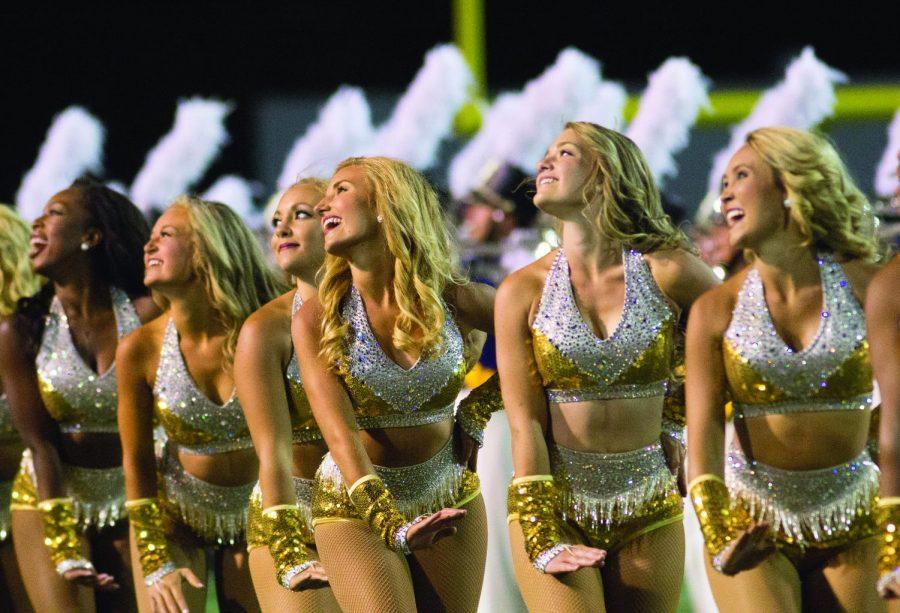A day in the life of the Pride of Dixie
October 2, 2018
Butterflies and adrenaline coursing through veins, stadium lights blaring from above and screams of crowds chanting, this is a day in the life of the University of North Alabama Pride of Dixie marching band.
The UNA band program is the largest student organization on the UNA campus. The program began in 1949 with 12 members and has increased to more than 230.
It is composed of different sections of members who play instruments and the auxiliary units, which are the Lionettes, Majorettes and Color Guard. The Pride of Dixie performs at all home games. It also travels across the state and out of state showcasing its halftime show at high school football games, band competitions and exhibitions.
“Membership in the band means a great deal to me,” said Madeline Hammond, captain of the Lionette dance line. “Being a small part of a large group of diverse members who are working together with a common sense of purpose is extremely rewarding, and I am grateful for my opportunity to contribute to the group as a whole.”
Executing a halftime show takes many hours of practice in the band’s set rehearsal time and outside of rehearsal. The entire band meets for full ensemble rehearsal daily from 2 to 3:30 p.m. Practice for the band takes place at Pride Field, directly across from Rice and Rivers Hall, or at Braly Stadium.
The band will have an additional Saturday morning rehearsal if they have a performance that day.
“Our practice schedules are very busy, yet allow enough time for members to still be involved in other activities,” said Maegan Dorsett, a sophomore lionette.
Auxiliary members’ practice begins in the summer. During the summer, they have workouts and practice every weekend. The fall practice for the auxiliary begins at 1:15 p.m. with a workout with their trainer.
“Practices are very demanding both in-season and out of season as well, but they are equally rewarding,” Hammond said. “We practice at 6 a.m. We practice in extreme heat. We practice in the rain. We do whatever it takes to get our performances to the high standards that have been set by outstanding Lionette lines of the past.”
Hammond added the physicality of their show demands they condition themselves physically throughout the year.
Both auxiliary and ensemble members dedicate time outside of rehearsal to work as a group in a sectional practice.
“Outside of the group, I have sectionals that meet weekly, along with individual practice time daily, and this private time can range from anywhere between 30 minutes and two hours each day,” said Nicholas Watts, a senior baritone player.
The band’s demands of their practice schedule depends on the detail and intricacy of their performance show.
“It cultivates a level of discipline and focus that I know will benefit each of us even after we leave UNA and enter the workforce,” Hammond said.
This year, the band will perform at the Bands of America Exhibition at the Southeastern Super Regional in Powder Spring, Ga and the Northwest Georgia Marching Championship in Cass, Ga.
The band will also perform at the National Collegiate Marching Band Championship Bowl in Columbia, S.C.
“There’s always that nervousness and butterflies that hit you as you walk onto the field, but the minute you hear that first note, the feeling goes away and you are encapsulated by that adrenaline,” said Merritt Malone, captain of the majorette line. “Performing for a cheering crowd is a feeling that’s unexplainable.”
Malone said she could not name a single person on that band field who does not love performing.
The band works to uphold a tradition of performance quality and standards that were set by past members of the ensemble.
“The Pride of Dixie is a constant reminder that I am part of something bigger than myself,” Watts said. “It instills in me that I am just as equal as the person next to me.”


